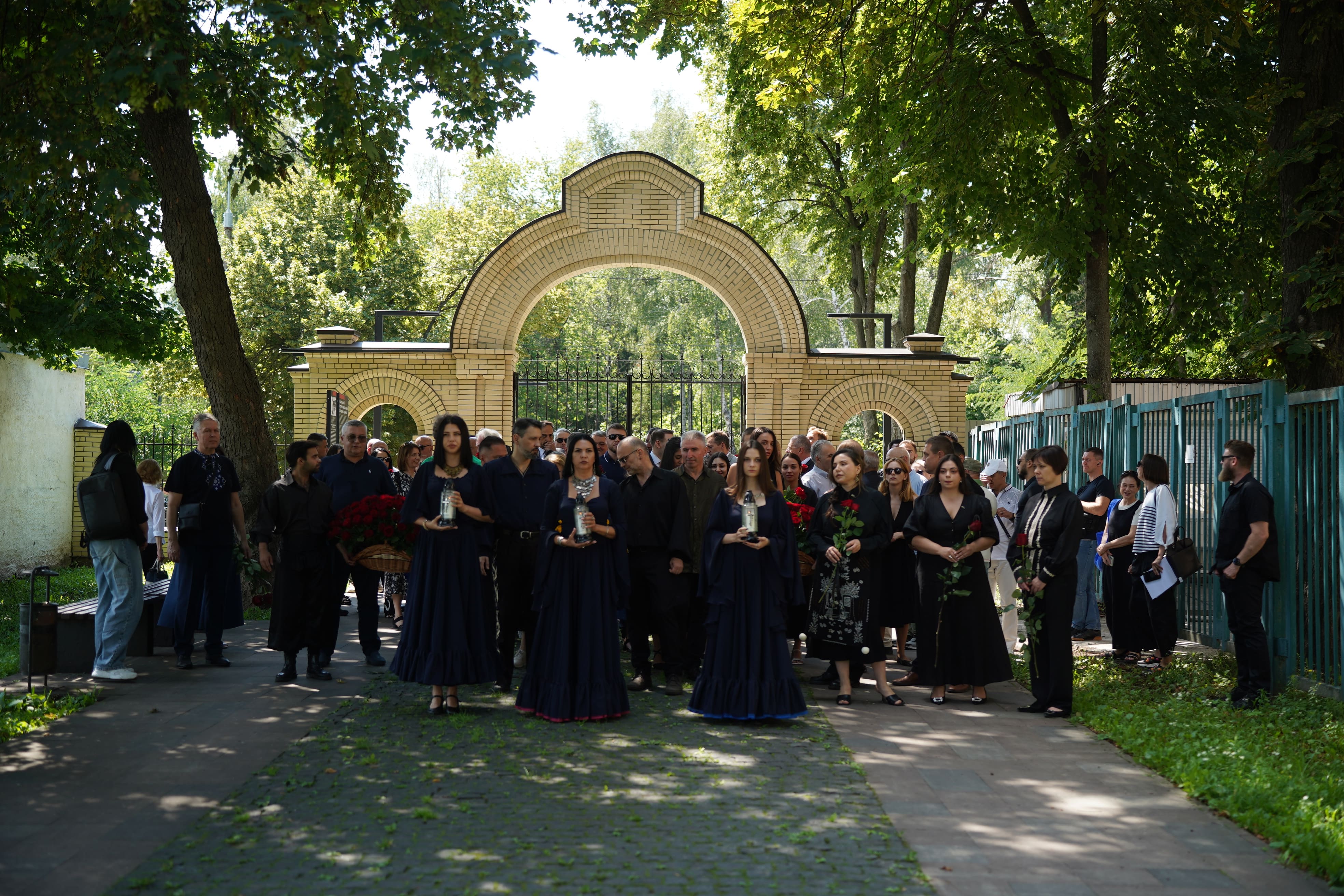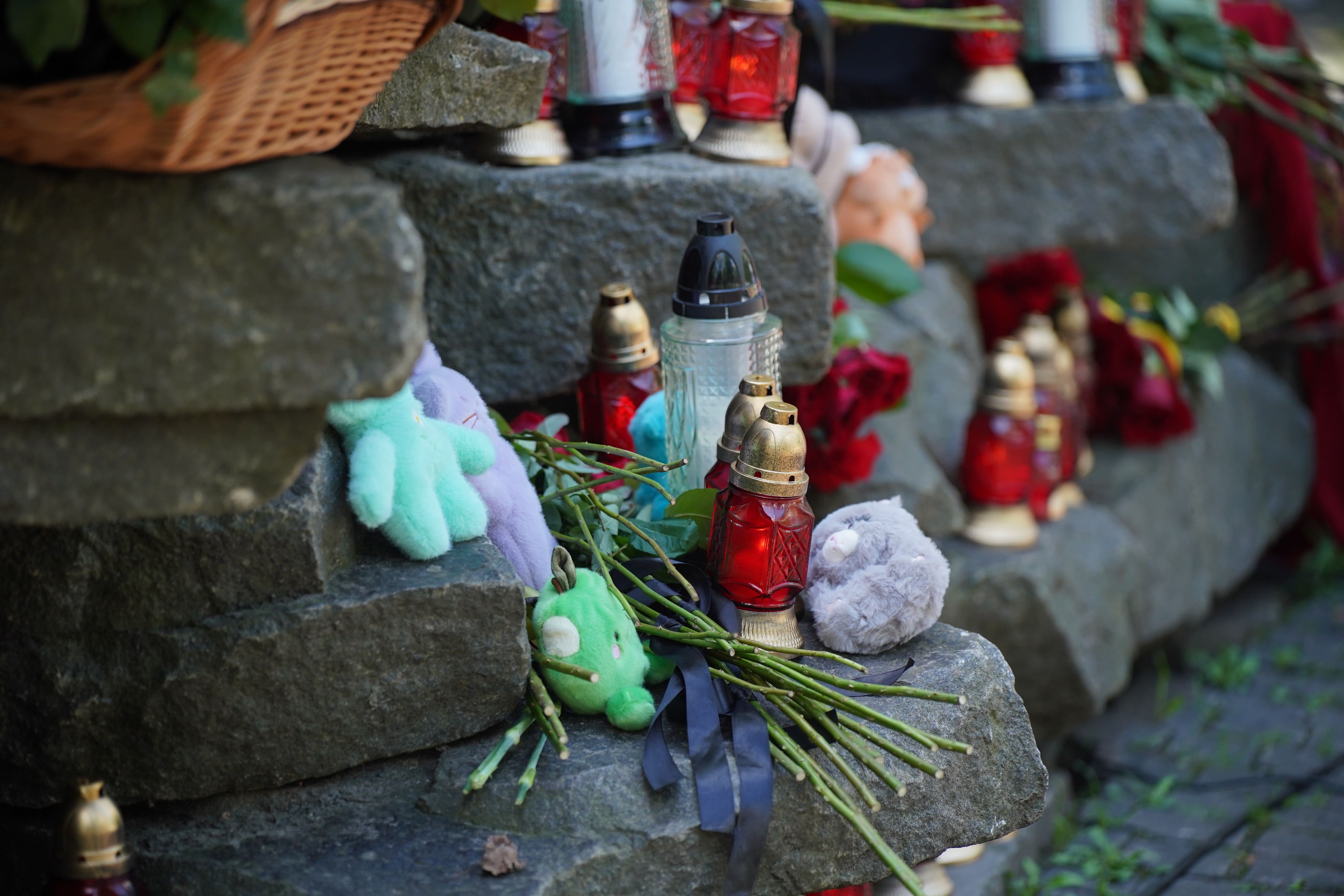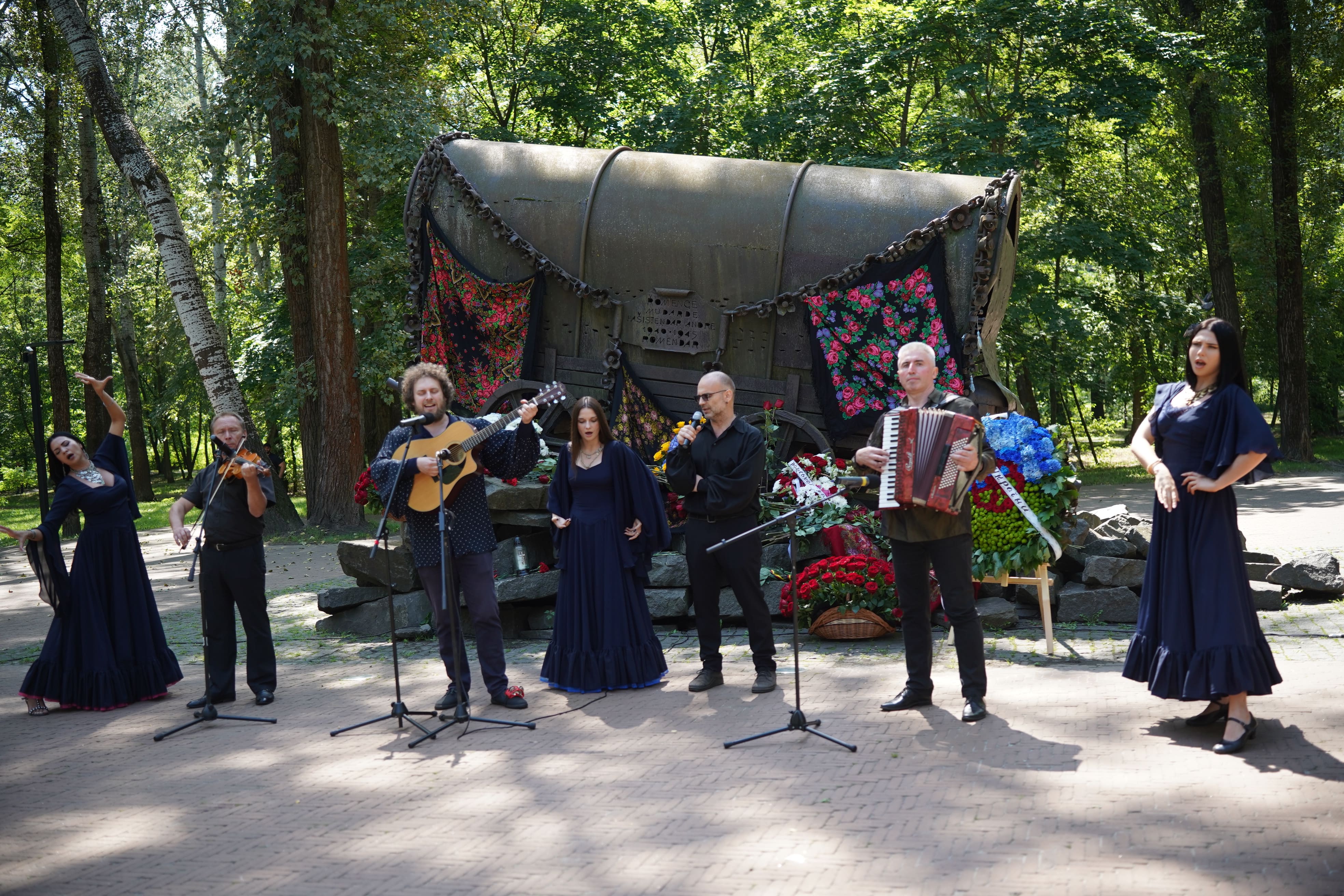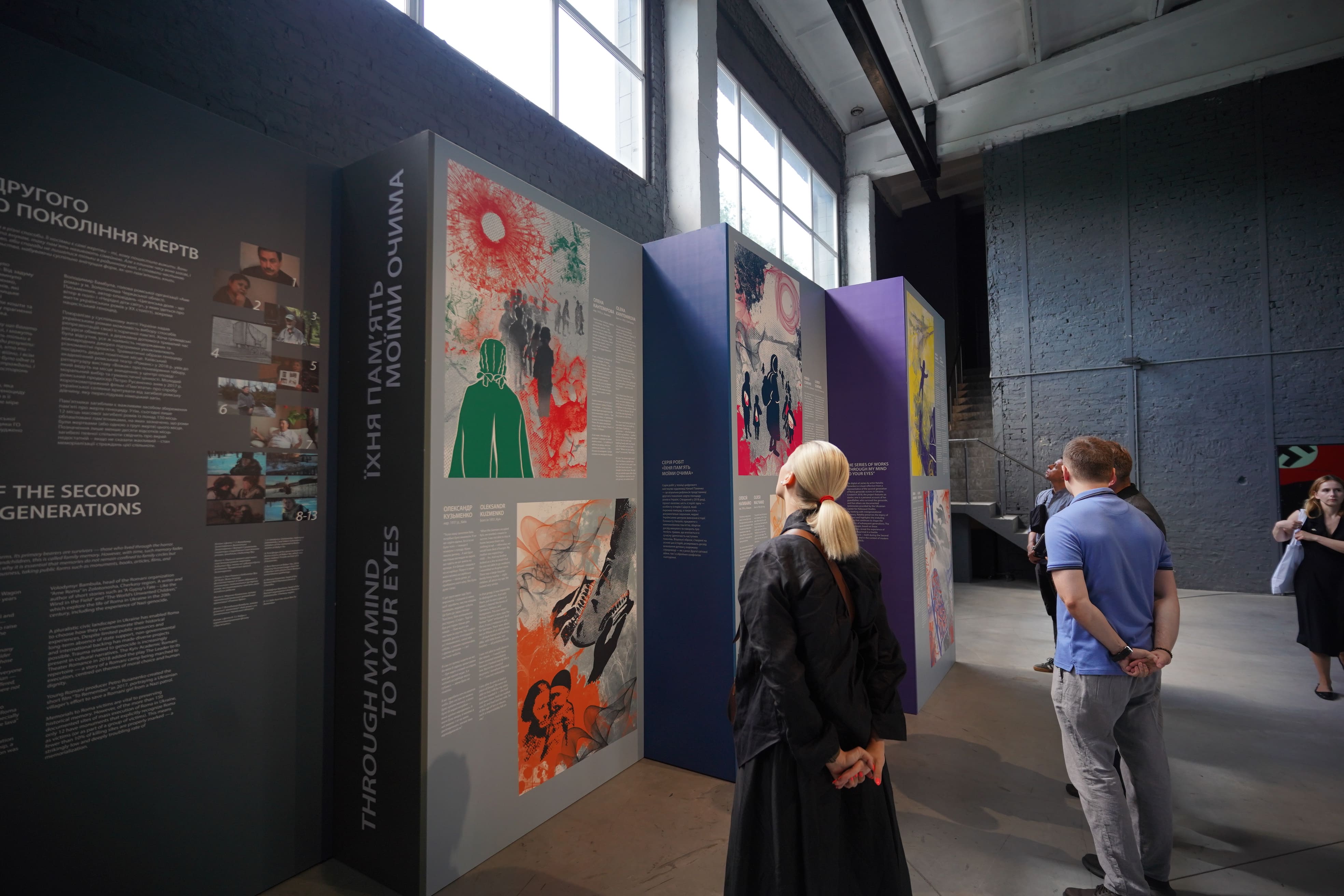Commemorative events were held to mark the Day of Remembrance for the Victims of the Roma Genocide
On August 2, 2025, commemorative events were held at the Babyn Yar National Historical and Memorial Preserve to mark the International Roma Genocide Remembrance Day. The mourning ceremony brought together the Roma community, representatives of the state, international organizations, diplomats, and cultural figures.
Participants of the event walked in a mourning procession to the Roma Wagon memorial — a tribute to the roma who were shot during the Nazi occupation of Kyiv in World War II.

Opening the ceremony, Roza Tapanova, Director of the Babyn Yar National Historical and Memorial Preserve, stated:
"For decades, the genocide of the roma was silenced. Today we are bringing these pages back into Ukrainian history — and this is the strategic mission of Babyn Yar: to preserve memory, speak the truth, and ensure no voice is erased."
This date has been officially recognized since 2004. However, for a long time the tragedy of the Roma community remained outside public attention and beyond the general context of memorialization.
"Memory is not only the recognition of the past but also responsibility for the future. It reminds us of the duty not to ignore those who need protection today. We are speaking about Roma children who still face discrimination in schools, about youth who seek equal access to education, employment, and participation in social life, about communities that have the right to safety, development, and respect. The memory of the Roma genocide is not only a tragedy of the Roma people — it is a tragedy of all Europe. At the same time, it is a shared opportunity for society to become stronger, more humane, and united," emphasized Volodymyr Yakovenko, Executive Director of the Youth Agency for the Advocacy of Roma Culture "ARCA."
According to researchers, between 220,000 and 500,000 roma were killed in Europe during World War II. In Ukraine, more than 140 sites of mass executions of the Roma population have been documented. Therefore, commemorative events are not only a tribute to the dead, but also a reminder of the dangers of xenophobia today.
"We stand at the site of one of the most forgotten genocides. A genocide that was deliberately removed from all textbooks — the way roma were murdered here: children, women, the elderly, and the young. Two days ago, they tried to kill even the memory of this genocide. A Russian 'Geran' struck the blood-soaked earth, just near the Wagon — a symbol of the Roma's fate, their journey, and their tragedy. Rashism differs little from Nazism. Both hate freedom, human dignity, the longing for liberty, for the sun, and the open road. Both want to pull a suffocating rat-uniform over the world — whether it bears a swastika or a two-headed eagle with a tricolor. Ukraine is fighting for the right to be itself, for everyone who calls it home, for the memory of those tortured and murdered on our land — by hunger, gas, bullets, Iskanders, or Kinzhals," said Viktor Yelenskyi, Head of the State Service of Ukraine for Ethnic Affairs and Freedom of Conscience.
For a long time, the extermination of roma was attributed to their "asocial behavior" rather than racial policy. Only in 1982 did the government of the Federal Republic of Germany officially recognize the persecution of roma during World War II as an act of racism. Thus, prolonged denial of the real motives for the persecution — namely racial hatred — not only distorted historical truth but also fueled modern prejudice.
These views are shared by Halyna Hryhorenko, First Deputy Minister of Culture and Strategic Communications:
"These events are a reminder that xenophobia, racism, and intolerance can lead to the most horrific crimes against humanity. Roma were persecuted not only for their ethnicity but also for their traditional way of life, which Nazis used as a justification for discrimination and extermination. The resilience and ability to survive despite all trials is an example of the unbreakable spirit of the Roma people — a spirit that resonates deeply in the hearts of all Ukrainians today."
Only a clear recognition of the genocide as an act of racism makes it possible to build memory policies that counteract discrimination today. Preventing new forms of hatred begins with an honest view of the past.
Today, roma, along with other citizens of Ukraine, experience all the consequences of war — loss of homes, occupation, injury, and captivity, but at the same time, they fight for freedom and independence alongside the country. That is why commemoration becomes not only a tribute to the past, but also a reminder of unity and society’s responsibility toward those who have faced discrimination and injustice.
"For Ukraine, this is not only a part of shared European memory but also a challenge: we must speak honestly about history, protect the rights of national minorities today, and counter discrimination in all its forms. Human rights are inviolable and universal. And protecting every individual, including members of the Roma community, is the duty of the state. Roma in Ukraine are part of our society. Their voice must be heard, and their rights — guaranteed. The Roma genocide cannot be forgiven and must not be forgotten," said Olena Antonenko, representative of the Secretariat of the Ukrainian Parliament Commissioner for Human Rights.
Matthias Schmale, UN Resident Coordinator in Ukraine, noted that it is important not to limit ourselves to symbolic commemoration but to combine it with concrete actions to protect the rights of historically discriminated communities:
"The best way to honor memory is through action. We must jointly defend human dignity and ensure justice. In these times of war, we must be especially vigilant. The full-scale invasion of Ukraine by the Russian Federation has placed many people in vulnerable positions. Among them, Roma communities face disproportionate challenges. Ukraine’s postwar recovery will not be complete unless it is inclusive. The inclusion of those historically left behind — such as the roma — must be central to Ukraine’s recovery efforts."
The "Romance" theater took part in the commemorative program, presenting literary and musical compositions dedicated to the genocide and history of the Roma people.
The ceremony concluded with the lighting of candles and the laying of toys at the Roma Wagon memorial — in memory of the Roma children who were victims of the genocide.


As part of the events marking the International Roma Genocide Remembrance Day, the exhibition "The Invisible. Resilience: Past and Present of the Roma" was opened. It is on display at the "Living Memory" center (46A Yuri Illienko St.) and is open Monday–Friday from 10:00 to 19:00, Saturday–Sunday from 11:00 to 18:00. Admission is free. The exhibition will run until September 7.

The commemorative events were organized by the Youth Agency for the Advocacy of Roma Culture "ARCA" and the Babyn Yar National Historical and Memorial Preserve, with support from the Embassy of Germany, the State Service of Ukraine for Ethnic Affairs and Freedom of Conscience, the Ukrainian Institute of National Remembrance, and partner civil society organizations.
Photo: Ruslan Syngaiievskyi
See also
- The UN to Commemorate the Victims of the Holocaust. ARCA to Take Part in the Commemoration
- Don't stop: a year of working in uncertain conditions
- Merry Christmas!
- Romani Language Day: Language as the Root of Identity
- Defenders of Ukraine Day: Honor and Gratitude
- Babyn Yar Remembrance Day
- Шукаємо двох фахівців: відеограф, інтерв'юер
- Independence of Ukraine: Strength in Diversity
- 23 August – National Flag Day of Ukraine
- Youth Day: the power that shapes the future
- Roma Holocaust Victims to Be Commemorated in Kyiv
- Position of the NGO “ARCA” Regarding the Situation Around NABU and SAPO
- Official Statement on the Incident in Velykyi Bereznyi
- Open Letter from the Roma Civil Society of Ukraine
- Молодіжна агенція з адвокації ромської культури «АРКА» запрошує до своєї команди SMM-менеджера/ку
- Day of Ukrainian Unity and Liberty
- August 24th — Ukrainian Independence Day
- Address on the occasion of the Roma Holocaust Remembrance Day
- Statement by Roma and pro-Roma civil society
- May 16 - Romani Resistance Day
- Open letter of the Roma Council of Ukraine and the Roma Youth Council